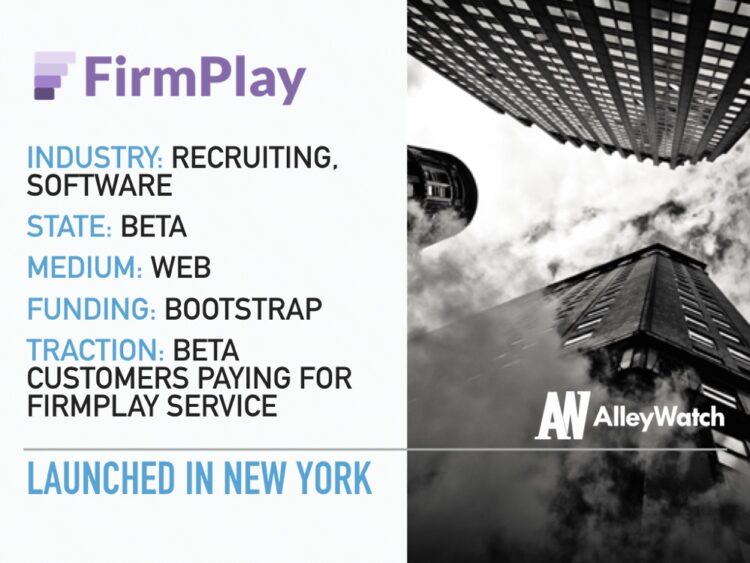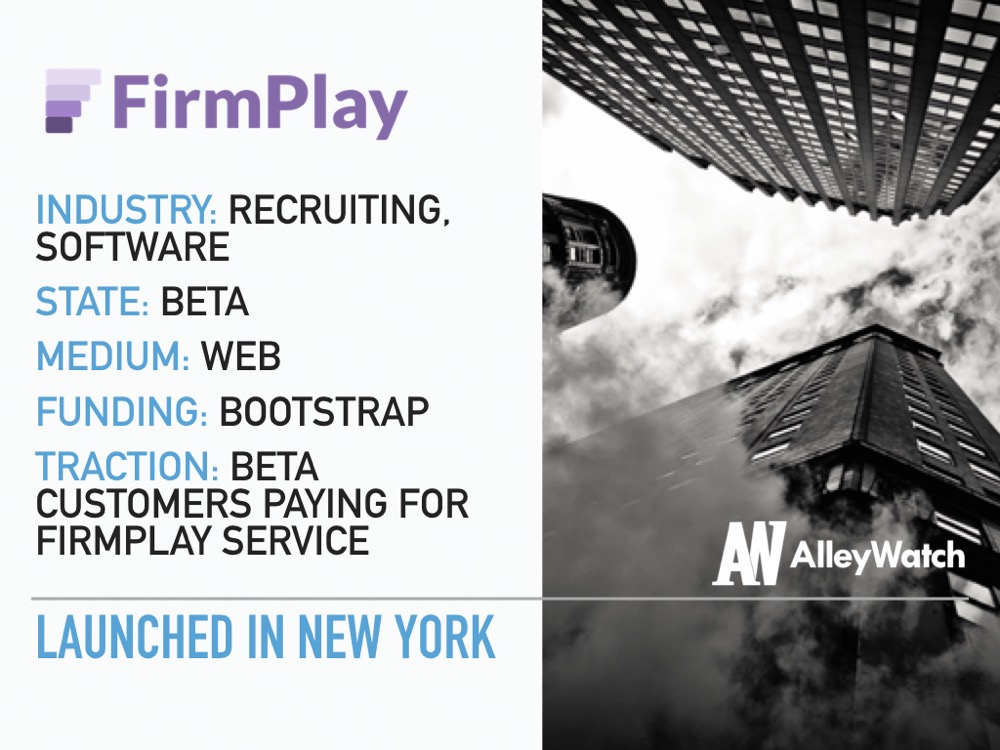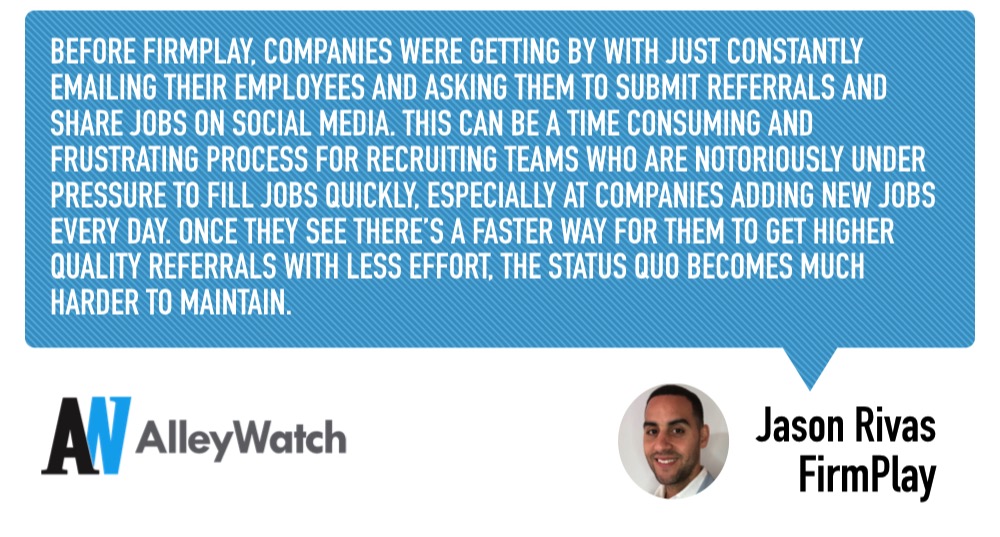Attracting talent is the lifeline of any growing startup and while the internet has introduced new ways to attract talent it has also created a bottleneck in qualifying and finding the right talent. Vetted employee referrals have become the preferred way to hire candidates for a multitude of reasons. Not only do employee referrals expedite the hiring process, companies with an engaged workforce experience a 19.2% growth in operating income over a 12-month period on average. FirmPlay has created the software specifically built for organizations’ to actively manage employee referrals. At its core, employees can seamlessly sync and integrate contacts from various social media networks into FirmPlay’s and the company can proactively search the platform to match referral candidates with jobs. Currently in beta, companies with 20 employees or less can access FirmPlay’s services through a freemium model with the company’s full launch coming next year.
AlleyWatch sat down with founder Jason Rivas to learn more about the importance of employee referrals in recruitment and the company’s future plans.
Tell us about the product or service that FirmPlay offers.
Today, almost 90% of employers say their best hires come from employee referrals. FirmPlay gives these employers a much faster and easier way to tap into their employees’ networks to find great hires. I often compare FirmPlay to popular consumer apps, which have been successfully tapping into our personal networks for over 10 years. Look at the fitness app ClassPass, for example, where you can connect to your Facebook account and find friends that you can invite to the app and earn rewards. We believe the employee referral process should be just as simple and straightforward.
FirmPlay allows employees to easily sync their contacts from various online networks (e.g. social media, email and phone contacts, etc.) with the software, which is then instantly enriched with work history, skills, location, and social data. The software can suggest referrals for employees to submit to their company’s job postings and/or employers can proactively search the platform to instantly match people to jobs. Additionally, more quality referrals mean more cash in employees’ pockets because referral bonuses often pay upwards of $500.
How is FirmPlay different?
At its core, the process of finding quality employee referrals is a data mining and matching problem. On one side, you have a company’s open job listings, but on the other side, you have employees’ first-degree connections. The challenge is: how do you most effectively match the two?
Companies currently take two very low-tech approaches to this problem.
First, they’re literally emailing employees with jobs and asking them if “anyone comes to mind”, which I refer to as mental mapping. The human mind can realistically only recall 10% of the network, with huge recency bias.
Second, they’re asking employees to blast jobs out on social media. At best, jobs shared by employees on social media will see a 2% click-through rate, and it’s anybody’s guess how many of those clicks are actually qualified applicants.
 Through this traditional approach, referrals trickle in slowly (if at all); however, they’re often not the most qualified and usually come from just a small subset of hyper-engaged employees.
Through this traditional approach, referrals trickle in slowly (if at all); however, they’re often not the most qualified and usually come from just a small subset of hyper-engaged employees.
This approach made sense 10 years ago when the technology wasn’t there, but today we live in a world where our network connections are almost fully cataloged online across various networks, and there are over 2.7 zettabytes of data in our digital universe. FirmPlay is just organizing all that data – employees’ contacts, work experience, skills, and job – into one platform and overlaying it with powerful search capabilities to better match people to jobs.
For fast-growing, cash-strapped companies – who are competing for top talent in a super tight labor market – having the capability to unlock this referral talent pool can be the difference between missing and meeting key sales targets and product milestones.
In fact, a company with just 50 employees likely has over 30K potential job candidates in their employees’ networks that they could potentially tap into.
What market does FirmPlay target and how big is it?
At the moment, we’re offering pre-launch early access to NYC-based companies, and we plan to target companies with 500 employees, or less, and who are aggressively hiring. The global recruitment market is over $200B, with large enterprises making up a lot of that spend. We see a bigger opportunity at the smaller end of the market because there is no simple solution; pricing info is gated by salespeople, short trial periods, heavy implementation, and mandatory annual contracts.
Who do you consider to be your main competitors?
Before I became a founder, I always thought of competition as other startups offering a similar product. While that’s certainly true, our biggest competition is the status quo. For almost any startup, before your product came along, most companies had been operating successfully for years without you in the picture. The challenge is solving a problem so painful that they’re jolted from inaction.
Before FirmPlay, companies were getting by with just constantly emailing their employees and asking them to submit referrals and share jobs on social media. This can be a time consuming and frustrating process for recruiting teams who are notoriously under pressure to fill jobs quickly, especially at companies adding new jobs every day. Once they see there’s a faster way for them to get higher quality referrals with less effort, the status quo becomes much harder to maintain.
What is the business model?
We’re big fans of the “Product led Growth Approach”- this term was coined by OpenView Partners. We will use innovative products to knock down the barriers that recruiting teams face. For too long, recruiting technology has been hidden behind demo request forms, sales pitches disguised as product demos, opaque pricing, and long-term contracts. We want to give recruiting teams the power to easily evaluate our technology and bring innovation to their organizations with as little friction as possible. To that end, we operate on a freemium model with clear, transparent pricing. The SaaS product is free to use with up to 20 employees and $5 per employee per month beyond that.
What inspired the start of FirmPlay?
The employee referrals product is actually a bit of a pivot for us. Our original product was based on employee advocacy; it gave recruiting teams the ability to easily disseminate corporate content to employees to share on their personal, social media networks. While the product saw good initial traction, it was clear to us that social media traffic and impressions would never be a top priority for recruiting teams, who are ultimately evaluated on filling jobs quickly and cost-effectively. On top of that, a lot of the content they asked employees to share were simply job postings. We realized that recruiting teams were trying to get their employees’ social media followers to apply to open jobs, aka employee referrals. That is when we sat down with our current customers to understand the challenges they face with employee referrals, and our new product was born.
What are the milestones that you plan to achieve within six months?
For the rest of 2019 we’ll continue to selectively grow the number of NYC-area companies with early access to the tool, so we can work closely with them to get critical feedback to improve the product. Beyond that, we’re looking to officially launch in early 2020.
What is the one piece of startup advice that you never got?
There will be no shortage of people willing to give you advice on your startup, the hard part is deciding what’s relevant and what to ignore.
If you could be put in touch with anyone in the New York community who would it be and why?
I’m a big fan of Daniel Chait, CEO and cofounder of Greenhouse Software. Before they launched in 2012, there were dozens of solutions in the applicant tracking software category. I think they’ve done an awesome job of redefining the category as not just a tool to store and track resume submissions but rather to help recruiting teams optimize their entire hiring process. They gained traction super fast and I think he may have closed their first $3M in ARR all by himself before bringing on a sales team.
Why did you launch in New York?
Well, the easy answer is I live here, which makes it a no brainer. From a business perspective, the recruiting community here is super tight-knit, despite it being such a big city. I always see the same faces at meetups and conferences. That means that when you provide value to the community, word of mouth spreads quickly. For example, I host a monthly networking breakfast for talent acquisition leaders at companies across the city. After hosting the first breakfast, I had people I’d never met emailing me that they heard about the breakfast from a friend or colleague and wanted to attend the next one.
Well, the easy answer is I live here, which makes it a no brainer. From a business perspective, the recruiting community here is super tight-knit, despite it being such a big city. I always see the same faces at meetups and conferences. That means that when you provide value to the community, word of mouth spreads quickly. For example, I host a monthly networking breakfast for talent acquisition leaders at companies across the city. After hosting the first breakfast, I had people I’d never met emailing me that they heard about the breakfast from a friend or colleague and wanted to attend the next one.
So if you’re reading this and lead talent acquisition at a company in NYC, reach out, the breakfast tab is on me!
What’s your favorite restaurant in the city?
Speaking of that networking breakfast, we recently held it at Maialino’s inside the Gramercy Park Hotel. I’ve heard it described as Roman-Italian soul food, which I think is pretty accurate. Awesome food and if you book the private room you get an amazing view of Gramercy Park. If you don’t already have a key to the park, I suppose it’s the next best thing.





